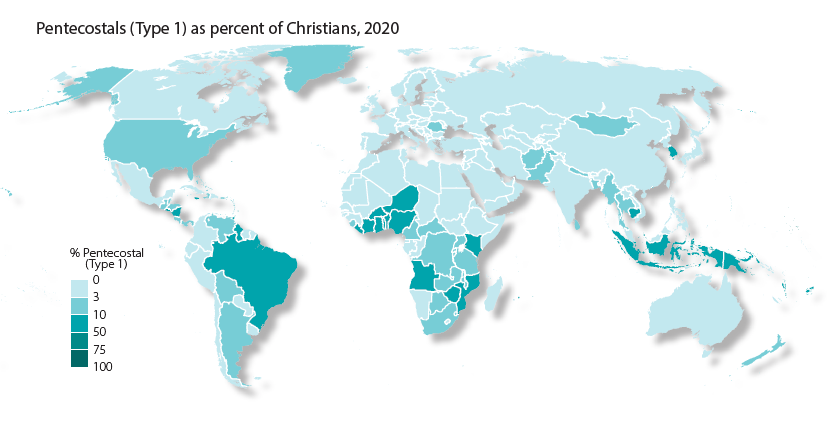Demographics of Pentecostals Worldwide
DR. GINA A. ZURLO
CO-DIRECTOR, CENTER FOR THE STUDY OF GLOBAL CHRISTIANITY
Here’s a short excerpt from our new forthcoming book, Introducing Spirit-Empowered Christianity: The Global Pentecostal and Charismatic Movement in the 21st Century (Oral Roberts University Press, 2020). For more on the subject, see the article by Daniel Sillman in Christianity Today, “Have Pentecostals Outgrown Their Name?”.
Pentecostals are defined as Christians who are members of the explicitly Pentecostal denominations whose major characteristic is a new experience of the energizing ministry of the Holy Spirit that most other Christians have considered to be highly unusual. This is interpreted as a rediscovery of the spiritual gifts of New Testament times and their restoration to ordinary Christian life and ministry. Classical Pentecostalism usually is held to have begun in the United States in 1901. For a brief period, Pentecostalism expected to remain an interdenominational movement within the existing churches, but from 1909 onward its members increasingly were ejected from mainline bodies and forced to begin new organized denominations.
Pentecostal denominations hold the distinctive teachings that all Christians should seek a post-conversion religious experience called baptism in the Holy Spirit and that a Spirit-baptized believer may receive one or more of the supernatural gifts known in the early church: the ability to prophesy; to practice divine healing through prayer; to speak (glossolalia), interpret, or sing in tongues; to sing in the Spirit, dance in the Spirit, pray with upraised hands; to receive dreams, visions, words of wisdom, words of knowledge; to discern spirits; to perform miracles, power encounters, exorcisms (casting out demons), resuscitations, deliverances, or other signs and wonders.
From 1906 onward, the hallmark of explicitly Pentecostal denominations, by comparison with Holiness/Perfectionist denominations, has been the single addition of speaking with other tongues as the “initial evidence” of one’s having received the baptism of the Holy Spirit, whether or not one subsequently experiences regularly the gift of tongues. Most Pentecostal denominations teach that tongues-speaking is mandatory for all members, but in reality not all members practice this gift, either initially or as an ongoing experience. Pentecostals are defined here as all associated with Pentecostal denominations that identify themselves in explicitly Pentecostal terms, or with other denominations that as a whole are phenomenologically Pentecostal in teaching and practice.
Countries with the largest numbers of Pentecostals are Brazil, Nigeria, and the United States. Pentecostals in the Marshall Islands (population 53,000) constitute both the highest percentage of all Christians (69.9%) and of the population of the country (66.0%). Pentecostal denominations depend mainly on foreign missions and church planting as means of growth. Pentecostals also make up a high percentage of all Christians in Cambodia, where Christianity as a whole has grown significantly from 2000–2020.
